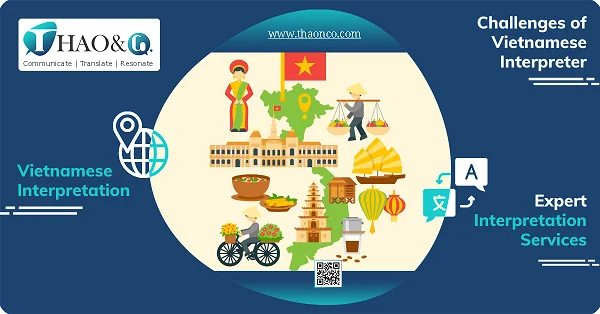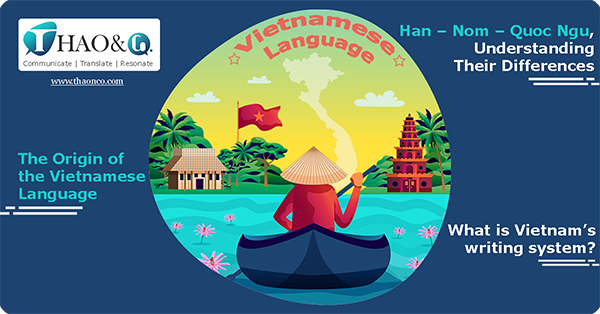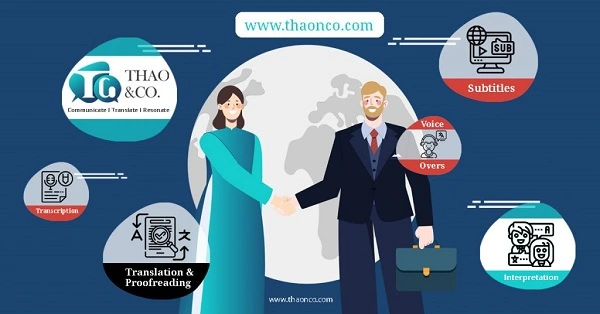Seeking out top-notch Vietnamese interpreter services is vital in this age of burgeoning commercial activity. Many companies prioritize securing a service provider that is both high-quality and trustworthy. In this article, Thao & Co. will disclose several useful tips to help you make the right decision when selecting Vietnamese Interpretation Services.
Language interpretation is the act of translating oral communication from one language to another while preserving the original meaning and message. This pivotal process facilitates fluid and rapid communication between parties that speak different languages.
Vietnamese interpretation is critical in both the business world and everyday life. Vietnamese interpretation entails interpreting spoken information from one language to Vietnamese and vice versa. Effective Vietnamese interpretation transcends direct, word-by-word conversion; it requires capturing and conveying the speaker’s thoughts and intentions accurately.
As Vietnam continues to double down on its globalization efforts, the Vietnamese interpreting market is more bustling than ever. Notable fields with a high demand for Vietnamese interpreters include:

Vietnamese interpretation can be a both emotionally and financially rewarding career. Additionally, the path of an interpreter often offers the chance to engage with a variety of distinctive languages and cultures across the world. However, the interpretation field also comes with its own challenges.
The complex pronoun system of Vietnamese, while a cultural hallmark, presents considerable challenges for interpreters. The Vietnamese language features a rich and diverse system of personal pronouns, each of which carries different emotional subtleties. Such a system is largely absent in other languages.
Take English as an example. The pronoun “I” is universally applied regardless of the speaker’s age or gender. Conversely, in Vietnamese, personal pronouns are selected based on a matrix of factors including age, gender, and the relational context to the speaker. This specificity often results in an interpretation dilemma, as conveying these nuances in other languages can strip the sentences of their original emotional color, leaving them stark and less vibrant.
The plethora of function words in Vietnamese adds another layer of complexity to Vietnamese interpretation. Take the sentence “Cô ta xa quê đã mấy năm.” (“She has been away from home for several years”), where the word “đã” (“has”) signifies that attention should be placed on the length of her absence, not the action itself.
A good interpreter must be able to discern where the speaker would like to emphasize and accurately convey this in the target language. Similarly, when the target language has fewer function words, capturing the essence of the original message poses additional challenges.
The evolution of language is deeply intertwined with the threads of history and culture. Amidst its historical turbulence, the Vietnamese language has become evermore diversified with the incorporation of numerous borrowed words. Compared to authentic Vietnamese expressions, borrowed words carry distinct shades of meaning.
Words of Sino-Vietnamese origin often convey a sense of formality and seriousness, while native Vietnamese terms foster a sense of intimacy and simplicity, more suited to casual speech. Appropriate and tactful word choices are additional requirements of Vietnamese interpretation to ensure that interpreted information suits the nature of the dialogue.

Navigating cultural variances presents a notable challenge for Vietnamese interpreters. For instance, Western nations generally favor a comfortable, direct style of communication.
On the other hand, Eastern societies place a high value modesty, hierarchy, and respect. When these cultural intricacies are not effectively interpreted, it can result in one side being perceived as overly distant, while the opposite side may be seen as excessively intimate.
Certain professions demand that interpreters possess not only proficiency in a foreign language but also a thorough understanding of industry-specific subjects. Interpreters working within niche sectors such as medical, technical, and tourism industries must go beyond basic language skills.
They are required to not only be versed in technical terms but also possess extensive knowledge of the industry. Errors, no matter how small, can lead to significant repercussions.
Industry professionals often employ jargon that may not be readily found in standard dictionaries. To succeed as an interpreter, it is necessary to accumulate extensive experience over time and obtain specific certifications.
The role of an interpreter is inherently high-stress, necessitating constant preparedness and composure, even amid unforeseen circumstances. In addition, an interpreter must continuously enrich their linguistic arsenal with extensive vocabulary and a firm grasp of grammar to maintain accuracy when translating into/from Vietnamese. The critical nature of international interpreting sessions, coupled with the demand for swift and accurate interpretation, further amplifies the challenging aspects of an interpreter’s job.
To excel as a Vietnamese interpreter, it is important to engage in continuous self-improvement and learning. The following are crucial skills that a Vietnamese interpreter should have:

Many clients are keenly interested in the cost of Vietnamese interpreter services. However, there is no fixed rate, as pricing varies based on numerous factors.
A top-notch, highly skilled interpreter plays a crucial role in enabling companies to communicate their intended message with precision. This accurate conveyance of content can unlock many opportunities for companies aiming to enter promising markets and broaden business operations.
A proficient interpreter not only interprets words but also effectively communicates the speaker’s intent and goodwill, aiding clients in making a favorable impression on business counterparts.
To guarantee a successful interpretation process, you can consider the interpreter services offered by Thao & Co. Our team features native linguists who are also seasoned interpreters, each with a solid track record in the industry. These adept professionals are well-qualified, boasting an extensive knowledge of both Vietnamese and the respective languages they translate.
Additionally, our dedication to a professional, advanced, and secure workflow offers a notable advantage that satisfied many clients over the years. Partnering with Thao & Co. to gain access to beneficial features in our proprietary platform, enhancing your overall experience.

Furthermore, every client will be provided with a personal account to access our proprietary platform, allowing for the convenient tracking of project progress at any time and from any location.
Our platform also allows for simultaneous management of multiple projects. This approach enhances the confidentiality of project information by eliminating reliance on third-party services.
Above are the details and criteria to evaluate Vietnamese interpreter services. Vietnamese interpretation demands quick comprehension, a profound love for language, and an eager spirit for continuous learning.
Amidst the era of globalization, the demand for Vietnamese interpreter services has become higher than ever before. At Thao & Co., we offer comprehensive interpretation services from Vietnamese into numerous languages and vice versa, facilitating smooth and uninterrupted business operations, cultural exchanges, etc.
Should you require consultation on our services, kindly fill out the Get a Quote Form. Our team will reach out to offer support and provide you with a detailed quotation as soon as possible.